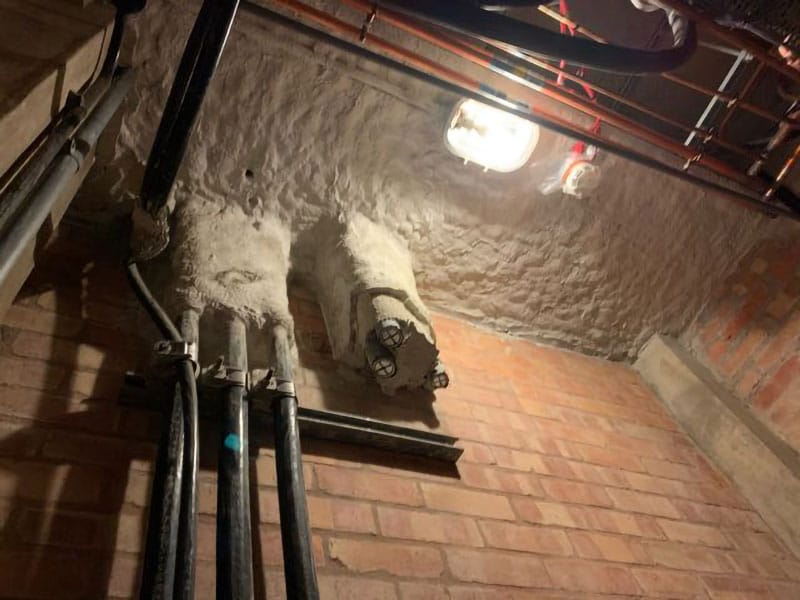Why is asbestos duty to manage training essential in hospitals and healthcare facilities?
Before it was banned from the UK in 1999, asbestos was used in the construction of health facilities. This was due to its durability, fireproofing, and insulation. Commonly, asbestos-containing materials (ACMs) are found in various areas of a building. These include ceiling tiles, flooring, insulation, and roofing.
Today, the serious health effects of asbestos exposure are well-known. Inhaling or ingesting airborne asbestos fibres can cause respiratory problems and cancers. These diseases are typically difficult to treat and highly life-threatening.
In a healthcare facility, the goal is to treat patients and improve their well-being. Unfortunately, patients often have compromised immune systems. This is why preventing asbestos exposure is particularly important.
Understanding asbestos and its risks
There are many health hazards associated with asbestos exposure. They include the following:
- Asbestosis, a chronic lung disease caused by asbestos fibres. This often leads to lung tissue scarring and breathing trouble.
- Mesothelioma, a type of cancer that affects the abdomen, chest cavity, and lungs.
- Pleural effusions, which is when fluid accumulates between the chest wall and lungs. This can cause breathing trouble and discomfort.
- Pleural thickening, which is when the lining of the chest cavity and lungs thicken and swell. This typically causes respiratory trouble.
- Respiratory problems, including COPD and lung inflammation.
Other risks include impaired lung function, lung cancer, and suppression of the immune system.
Legal requirements for asbestos management
According to the Control of Asbestos Regulations 2012 (CAR 2012) and the Health and Safety Executive (HSE), the person responsible for the maintenance of a property also has a duty to manage asbestos.
The person with this duty — the dutyholder — handles the following:
- Locating ACMs and assessing their condition
- Keeping an updated asbestos register that details where the ACMs are located and their condition
- Creating a plan that will keep everyone safe from asbestos exposure
- Executing the plan in a way that’s compliant with the law
- Informing anyone who may be affected by the state of asbestos in the building
Healthcare facilities don’t have to follow specific legal guidance or best practices for asbestos management. Healthcare buildings fall under non-domestic properties. The best practices and laws are the same as for all other commercial buildings.
Non-domestic properties in the UK, including healthcare facilities, are legally obligated to assess and analyse the ACMs on the property.
Dutyholders must determine if the condition of the ACMs makes them dangerous to anyone in the buildings. Also, they have to create a plan of action for the present and ongoing management of asbestos.
The need for duty to manage asbestos training
Who is duty to manage asbestos training for? It’s ideal for dutyholders who don’t have experience with asbestos management or who need to refresh their knowledge.
This training gives dutyholders the information they need to properly manage asbestos under CAR 2012.
The training covers topics like:
- How to conduct asbestos surveys and risk assessments
- Writing an asbestos management plan
- The legal responsibilities the dutyholder must follow
Taking duty to manage asbestos training isn’t a legal rule. But, the HSE does need dutyholders to recognise ACMs and properly manage them. Often, the only way a dutyholder can do this and stay compliant is by having the appropriate training.
Unique challenges of asbestos management in hospitals
Asbestos management laws don’t change based on the type of non-domestic premise. However, the challenges of managing and removing asbestos do.
In a healthcare setting, there are unique challenges that have to be considered so that workers, patients, and visitors stay 100% safe. Here are just some of the challenges of asbestos management in hospitals:
- No patient can be exposed to asbestos at all during maintenance or removal. This is even more important for those with compromised immune systems.
- The asbestos dust generated from asbestos repair or removal can disturb other contaminants. This can cause an infection if inhaled. Air purification is always necessary in asbestos projects, but it may be even more critical in a healthcare setting.
- Some health facilities, like hospitals, operate 24 hours a day, seven days a week. Operations can’t be impaired or halted because of asbestos management.
Healthcare facilities typically need to operate continuously. Plus, patients are particularly vulnerable to anything that could further impact their health. That’s why extra care has to be exercised by the dutyholder.
Key components of duty to manage asbestos training
The main topics that dutyholders will learn during duty to manage asbestos training are as follows:
- How to determine the location of ACMs so that they can be inspected.
- How to determine how much of a risk the ACMs pose based on their condition and the type of material.
- How to create an asbestos management plan to deal with low-, medium- and high-risk ACMs.
- Options for asbestos management. Those range from ongoing visual inspections to encapsulation and, in more serious cases, removal.
- The legal requirements of asbestos management. That includes certifications and reporting according to the HSE.
- How to build an emergency-response plan in the event of unexpected asbestos exposure.
- Providing information and/or training to healthcare facility staff.
Dutyholders will learn everything they need to know to adequately check and manage asbestos on the premises with the purpose of making responsible decisions and keeping everyone safe.
The importance of duty to manage asbestos training for healthcare workers
Duty to manage training is not a legal requirement. Yet, it’s a primary source of information so that asbestos can be properly managed and compliance issues are avoided. Here’s why attending duty to manage training should be considered a requirement for dutyholders in a healthcare setting:
Protecting healthcare professionals and patients
There’s no such thing as a safe asbestos exposure event. Anybody who inhales or ingests asbestos fibres is at risk.
However, in a healthcare setting, there are a lot of patients who are already compromised when it comes to their health. Whether it’s asbestos fibres themselves or other contaminants disrupted by asbestos work, patient health could be made worse if the proper precautions aren’t followed.
Additionally, like in any commercial setting, workers and visitors also have to be considered. Everyone’s health is a priority. The only way to keep people safe is to have a firm understanding of how to effectively manage asbestos and make decisions.
Minimising legal and financial risks
Whether a dutyholder knows they’re making a mistake or not, companies and individuals can be held accountable for failing to follow asbestos regulations. For example, if high-risk ACMs are ignored, an asbestos management plan isn’t written up, or a dutyholder improperly disposes of asbestos and puts others at risk, consequences like high fees and even time in prison can result.
By knowing how to manage asbestos from the start, dutyholders and businesses can prevent these avoidable consequences.
Ensuring safe environments for healing
Proper asbestos management in a healthcare setting means ensuring that patients can properly heal in a supportive environment. For example, asbestos dust cannot reach areas where patients are. Additionally, noise levels should be considered so they don’t interrupt rest.
Overall, dutyholders have to put the well-being of patients first.
At the same time, dangerous asbestos must be dealt with so that there isn’t more of a risk for those in the building. All this has to be thoughtfully deliberated over so the best plan can be implemented.
Duration of the duty to manage asbestos certificate
The United Kingdom Asbestos Training Association (UKATA) provides training for dutyholders. This training follows CAR 2012 recommendations. You can take training from UKATA or you can look for UKATA-certified training programs.
- The DM1 course is for dutyholders who haven’t had prior training. The course lasts for one day or a total of six training hours.
- The DM2 course is for dutyholders who can verify they’ve taken training within the past six months but want a refresher. This course lasts for half a day or three training hours.
- There’s also a DM3 refresher course that can be taken as needed.
There’s no legal requirement for dutyholders to take a training course. Therefore, there isn’t an end date that dutyholders need to adhere to for renewing their training.
However, note that UKATA certifications for dutyholders are valid for six months.
Final thoughts
The task of managing asbestos in a healthcare facility is critical. Training for dutyholders plays a crucial role in ensuring safety and legal compliance.
Duty to manage asbestos training covers everything that dutyholders need to know. That includes making sure that patients, workers, and visitors are safe. Dutyholders also have to avoid legal consequences.
Healthcare facilities play such a vital role in our communities. It’s the dutyholder’s responsibility to ensure those facilities are safe as well.
For more information about duty to manage training, contact the Oracle team today.

Written by Brendan Coleman
Brendan Coleman, with decades of experience in the asbestos industry, is a dedicated Quality Manager. Certified as a surveyor and analyst, he is adept in operations and quality management with a keen focus on HSE compliance. His expertise is pivotal in maintaining high safety and efficiency standards. Brendan ensures our UKAS accreditation requirements are consistently met and exceeded, upholding stringent standards in asbestos remediation. His commitment to enhancing quality and customer satisfaction makes him an essential advisor in asbestos management.


